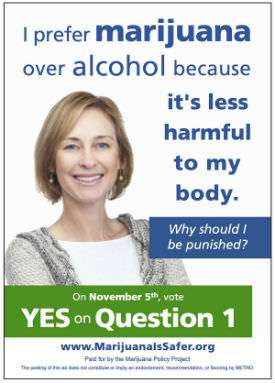Portland Did Not Really Legalize Marijuana, but the Success of Question 1 Is Still Good News

Although voters in Portland, Maine, supposedly legalized marijuana on Tuesday, that is not really what happened. As I noted last month, Question 1, which received support from more than two-thirds of voters, merely eliminated local penalties for possession of up to two and and half ounces. Under state law, possessing pot in amounts below that cutoff remains a civil violation punishable by fines ranging from $350 to $1,000. Hence it is not surprising that Portland Police Chief Michael Sauschuck says the initiative won't stop his officers from citing people for marijuana possession when they think it's appropriate. But he also says that won't be very often. "This doesn't change anything for us in terms of enforcement," Sauschuck told the Bangor Daily News. "But the actual statistics show this is a low priority for us."
Between June 2011 and June 2012, Sauschuck says, the Portland Police Department issued just 68 marijuana summonses in a city of 66,000. By comparison, the New York Police Department in 2011 made more than 50,000 arrests and issued more than 8,000 summonses for marijuana possession in a city of 8.2 million. New York City has a population that's 124 times as big, but it nabbed 868 times as many pot smokers. By that measure, New York is seven times as intolerant of marijuana as Portland.
The Portland Police Department's attitude toward marijuana consumers seems similar to the Seattle Police Department's. Asked if he plans to cite people who publicly celebrated the passage of Question 1 by lighting up a joint and memorialized the moment in photographs, Sauschuck replied, "Let's think about resource allocation. We're not going to go after these guys for smoking a joint."
So if Question 1 (which officially takes effect in a month) won't have much of a practical effect, what was the point? As I suggested last month, the Question 1 campaign was a dry run for statewide legalization efforts in Maine and elsewhere. Its messaging focused on the relative hazards of marijuana and alcohol, with ads featuring respectable-looking pot smokers asking, "Why should I be punished for making the safer choice?" Judging from the large majority the initiative attracted, that message, which also was prominent in Colorado's successful legalization campaign, resonates with voters.
Another plus: The marijuana-is-safer message really upsets pot prohibitionists, who hate it so much that they tried to censor it. "Maine is on the brink of creating a massive marijuana industry that will inevitably target teens and other vulnerable populations," warns former congressman Patrick Kennedy, chairman of the anti-pot group Project SAM, which has created a Maine chapter to fight legalization there. "Misconceptions about marijuana are becoming more and more prevalent. It's time to clear the smoke and get the facts out about this drug."
Guess who else is upset. "We're not against legalization of marijuana," an unnamed alcohol industry lobbyist tells National Journal. "We just don't want to be vilified in the process. We don't want alcohol to be thrown under the bus, and we're going to fight to defend our industry when we are demonized." That's fair enough. I myself sometimes worry that marijuana activists may alienate potential allies if they seem to be condemning alcohol or bashing drinkers. But it is perfectly legitimate to point out that the legal distinction between alcohol and marijuana makes no sense from a scientific or medical standpoint, and some potential benefits from legalization (such as fewer traffic fatalities) hinge on alcohol's greater hazards.
As a malt beverage enthusiast, I sympathize with the concern that beer may be unfairly tarnished by the message that pot is a safer choice. But if brewers want to defend their products, they will have to do better than this:
"We believe it's misleading to compare marijuana to beer," said Chris Thorne of the Beer Institute. "Beer is distinctly different both as a product and an industry."
Thorne notes that the alcohol industry is regulated, studied extensively, and perhaps more importantly already an accepted part of the culture.
"Factually speaking beer has been a welcome part of American life for a long time," he said. "The vast majority drink responsibly, so having caricatures won't really influence people."
Don't compare beer and pot, Thorne says, because they're different! Well, they're different in some ways and similar in others, which is what makes the comparison instructive. Thorne adds that marijuana should not be tolerated because it is not accepted, which seems pretty circular to me. He also says the responsible majority of drinkers should not be caricatured, and I agree, but the responsible majority of marijuana consumers surely have more to complain about on that score.


Show Comments (17)